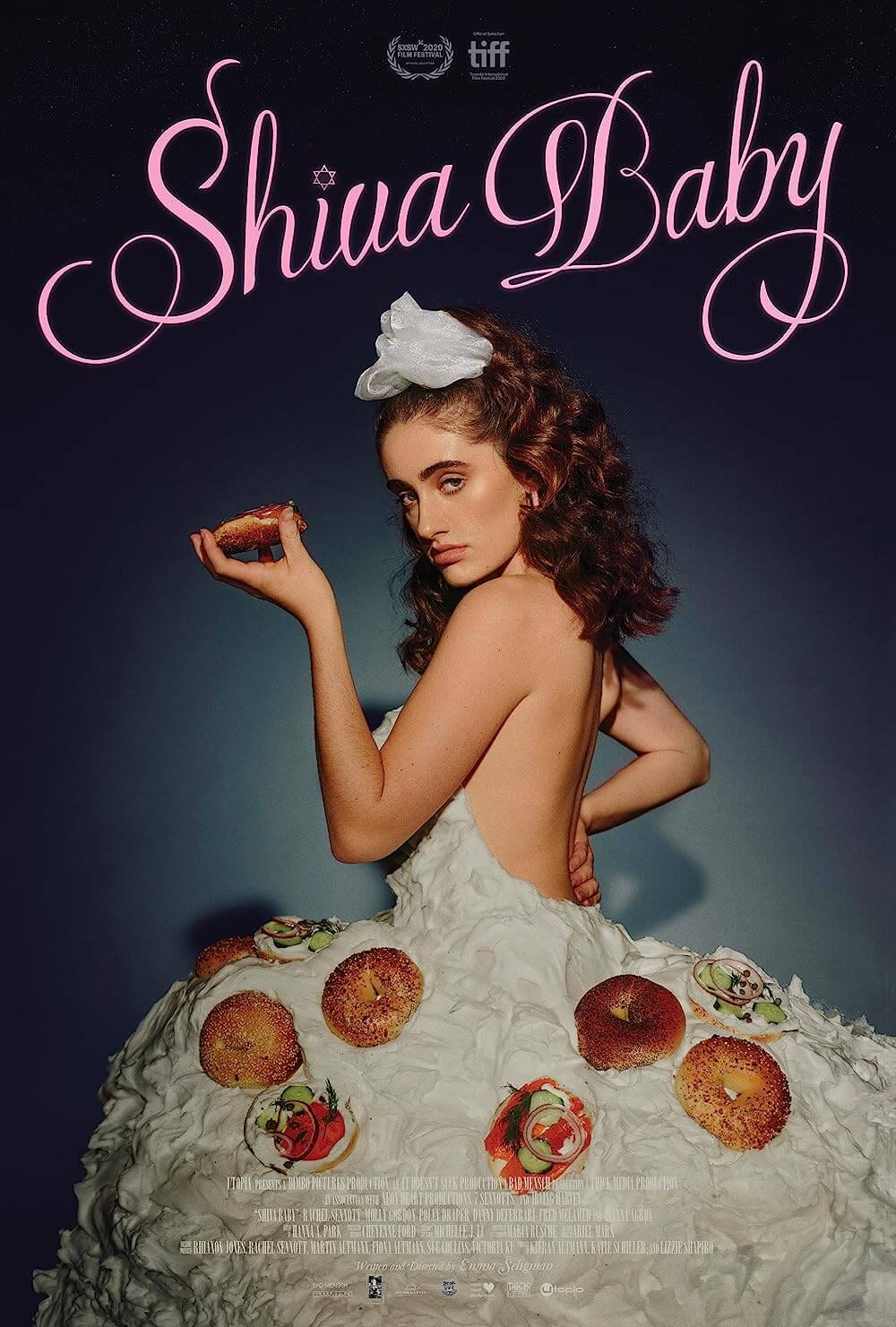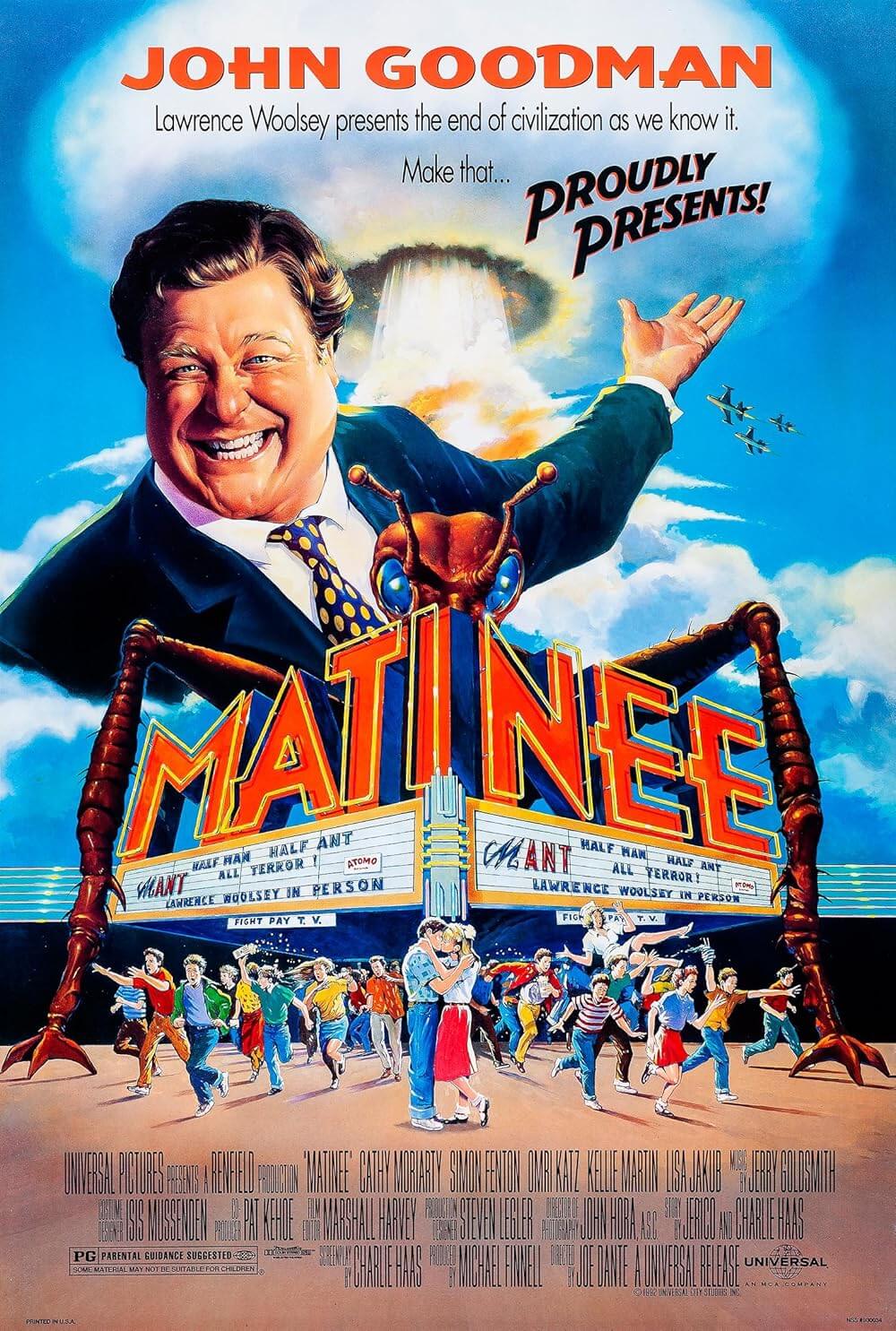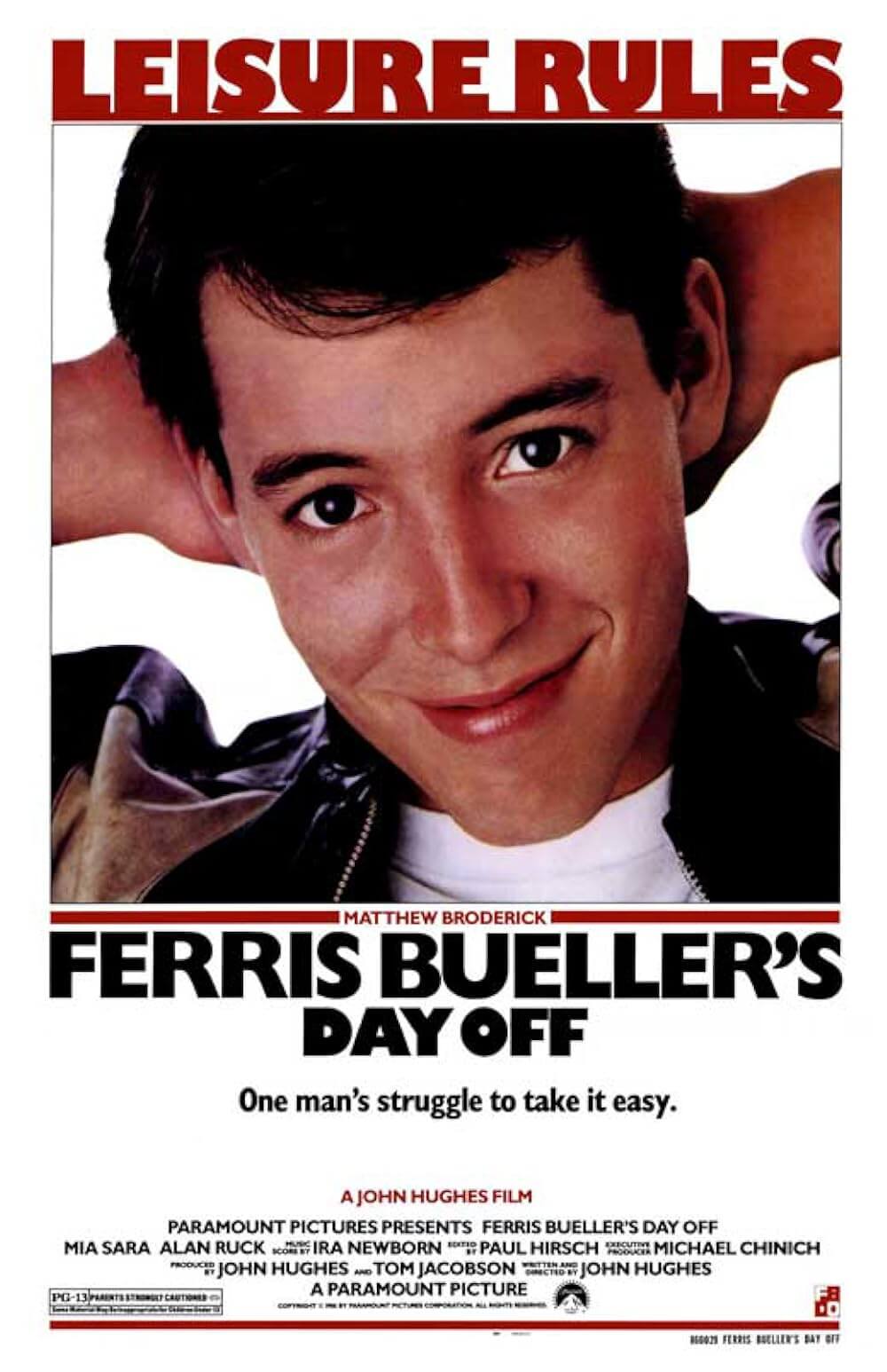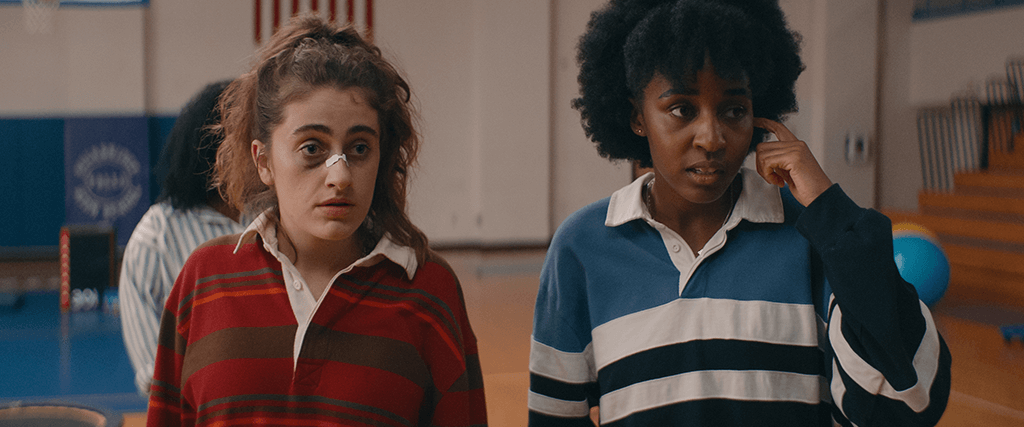
Bottoms
By Brian Eggert |
The sheer number of nasty teen comedies where straight white men behave like assholes only to learn valuable life lessons and get rewarded for their bad behavior is innumerable. Mathematicians are working on the exact figures, but I can tell you, it’s a lot. Bottoms adopts the tone and humor of those high-school raunchfests and applies them to queer young women. Sure, the guys in everything from Animal House (1978) to Superbad (2007) will go to extreme lengths to get laid, but young lesbians aren’t above such behavior. That’s the conceit of director Emma Seligman’s second feature after debuting Shiva Baby in 2020. Co-written by Seligman and star Rachel Sennott, the comedy blends David Wain’s parodic sense of humor on Wet Hot American Summer (2001) and They Came Together (2014) with the horniness of American Pie (1999), and then it filters them through a queer female lens. And while admirable for representing queer teen sexuality, the main selling point—as every comedy’s should be—is that it’s riotously funny, insidiously clever, always daring, and wholly unpredictable. I loved it.
At this point, you might be saying to yourself, “Didn’t Olivia Wilde already direct a horny queer teen movie in 2018 with Booksmart?” Well, yes, she did. That breakout hit certainly laid the groundwork for Bottoms, which is funnier and edgier, more willing to take risks and wild swings. If Booksmart was postmodern, then Bottoms is post-postmodern. The result reminded me of what Drop Dead Gorgeous (1999) wanted to be, but it didn’t quite have the capacity to achieve, and what perhaps Alexander Payne delivered with Election (1999). Seligman’s film can be silly and ridiculous; it can also be dark and test the limits of good taste to bold extremes. For instance, in a minor subplot, a loner teen boy dressed in black, ignored by seemingly everyone, plans to bomb his school. Could there be anything less funny in America’s rampant culture of school violence today? And yet, it earns a laugh. Seligman’s willingness to push boundaries in a vapid environment of humor policing is refreshing. She allows the film to be utterly absurdist and unserious, even as it somehow conveys genuine characters wrapped in layers of irony.
Bottoms celebrates that its characters can behave in shitty ways, and that’s not exclusive to jocks and cool kids. So while the screenplay resembles your standard Slobs vs. Snobs fare in its story structure, it gives the protagonists room to make awful mistakes that prove relatable. In that sense, it’s only right that Sennott plays the co-lead as PJ, an extension of her persona from Shiva Baby and last year’s Bodies Bodies Bodies, complete with scathing deadpan lines, unapologetic nastiness, and humanity buried beneath her barbed insecurity. In the first scenes, PJ and her best friend Josie (Ayo Edebiri) complain that their summer has proved fruitless in the sex department. They set out to make moves on their crushes—PJ pines after the model-like Brittany (Kaia Gerber), who’s attached at the hip to Josie’s crush, Isabel (Havana Rose Liu), girlfriend of über-bro Jeff (Nicholas Galitzine), their school’s worshipped quarterback. But after making enemies with the football team and not correcting an assumption by their friend Hazel (Ruby Cruz) that they spent their summer in juvie, the two friends find themselves in the principal’s office.
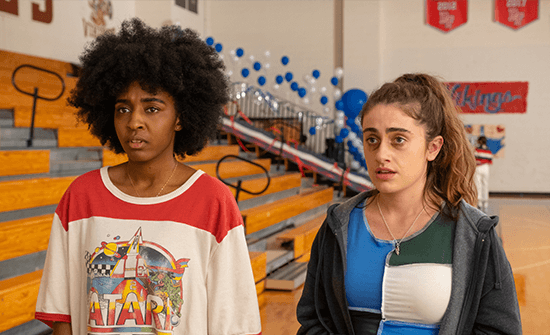 For reasons not worth explaining here, PJ and Josie create an elaborate lie that leads to starting a self-defense “fight club” for girls, hoping it will lead to some hanky panky with Brittany and Isabel. Teaching young women solidarity and how to protect themselves from the competing school, Huntington, which has a reputation for rape and other violence near the climactic Big Game, is “not the point.” The club is about getting laid. Their ranks include a range of young women, from the paint-sniffing Sylvie (Summer Joy Campbell), who desperately wants to kill someone with a sword, to the Black Republican girl Annie (Zamani Wilder) who proudly declares, “My vagina belongs to the government.” And after experiencing the liberating feeling of landing a punch, and getting up from a punch, the group begins to bond, learn actual fighting skills, and feel empowered for it. They even take a cue from David Fincher’s Fight Club (1999) and partake in explosive vandalism. By the time the film reaches its bloody finale, any sense of rules or realism has been long forgotten, yet there’s also a feeling of genuine emotion from an impressive control of tone and character on Seligman’s part.
For reasons not worth explaining here, PJ and Josie create an elaborate lie that leads to starting a self-defense “fight club” for girls, hoping it will lead to some hanky panky with Brittany and Isabel. Teaching young women solidarity and how to protect themselves from the competing school, Huntington, which has a reputation for rape and other violence near the climactic Big Game, is “not the point.” The club is about getting laid. Their ranks include a range of young women, from the paint-sniffing Sylvie (Summer Joy Campbell), who desperately wants to kill someone with a sword, to the Black Republican girl Annie (Zamani Wilder) who proudly declares, “My vagina belongs to the government.” And after experiencing the liberating feeling of landing a punch, and getting up from a punch, the group begins to bond, learn actual fighting skills, and feel empowered for it. They even take a cue from David Fincher’s Fight Club (1999) and partake in explosive vandalism. By the time the film reaches its bloody finale, any sense of rules or realism has been long forgotten, yet there’s also a feeling of genuine emotion from an impressive control of tone and character on Seligman’s part.
Sennott and Edebiri previously starred together in the painfully short and ridiculously funny Comedy Central series, Ayo and Rachel Are Single, where they remarked on sexuality and relationships today—a good primer for the humor in Bottoms. The surreal world onscreen is always a few steps away from reality. It’s the kind of movie that the wrong sort of viewer not attuned to its post-ironic wit might mistake as irresponsible. The football players wear their full field gear to class. Marshawn Lynch teaches feminist history. The slogan for the upcoming football game is “Get horny!” Instead of a car wash, members of the self-defense club sell their used panties. And the screenplay is littered with laugh-out-loud lines destined to become quotable. When Josie finally gets Isabel into her bedroom, the popular girl picks up one of Josie’s hoodies and remarks, “I always wanted one of these, but my mom says they hide your figure and make you look ugly.” The script has a way of getting at the underlying stereotype of a character, who they are, and what they would never say in the real world, and that’s incredibly smart and funny. But most of the characters are more than they seem.
Most comedies that inspired Bottoms look bland and are shot with simple, straightforward aesthetics. They’re brightly lit affairs with little consideration of visual choices, apart from supporting the jokes through punch editing. But Seligman reteams with her d.p. from Shiva Baby, Maria Rusche, to create fluid camera movements, careful blocking, and visually punctuated humor. Rusche has an exceptional understanding of space and how to use focus and zooms to punctuate a joke, and she draws from comedies, Fincher thrillers, and sports movies to build the look and feel of Bottoms. The score by Charli XCX and Leo Birenberg, too, works on several layers (though it’s less of a full character in the comedy than Ariel Marx’s vital music on Shiva Baby). Production designer Nate Jones borrows from classic teen comedies to create the high school, insomuch that the surroundings have an almost throwback appeal (there’s minimal smartphone and social media action onscreen) but not in such a way that the milieu feels dated. Rather, the film feels timeless, and that’s part of what will make it last.
Moreover, breathe a sigh of relief that Bottoms doesn’t feel the need to telegraph its politics or assign labels to everyone, as many movies do these days. Such messages are usually welcome, as in Barbie, but they’re often handled unsubtly. Seligman trusts her audience enough to allow them to glean PJ and Josie’s sexuality and strong but flawed personalities, while also recognizing that they don’t mesh with prescribed modes of feminism—and that’s what makes them interesting. They’re not politics first; they’re sex drive first, and that’s a rare quality among teen girls in movies. But whatever one might say about what it represents in the culture, Bottoms is just hilarious. My notes are filled with quotes and visual gags that I would love to share with you—from an unbelievable Mortal Kombat-style fight at a pep rally to a sad can of SpaghettiOs—but you should discover those for yourself. Best of all, Seligman walks a fine line, never stepping fully over into parody, never robbing her characters of a few well-placed moments of genuine emotion, and never allowing a single scene to pass without a big laugh.
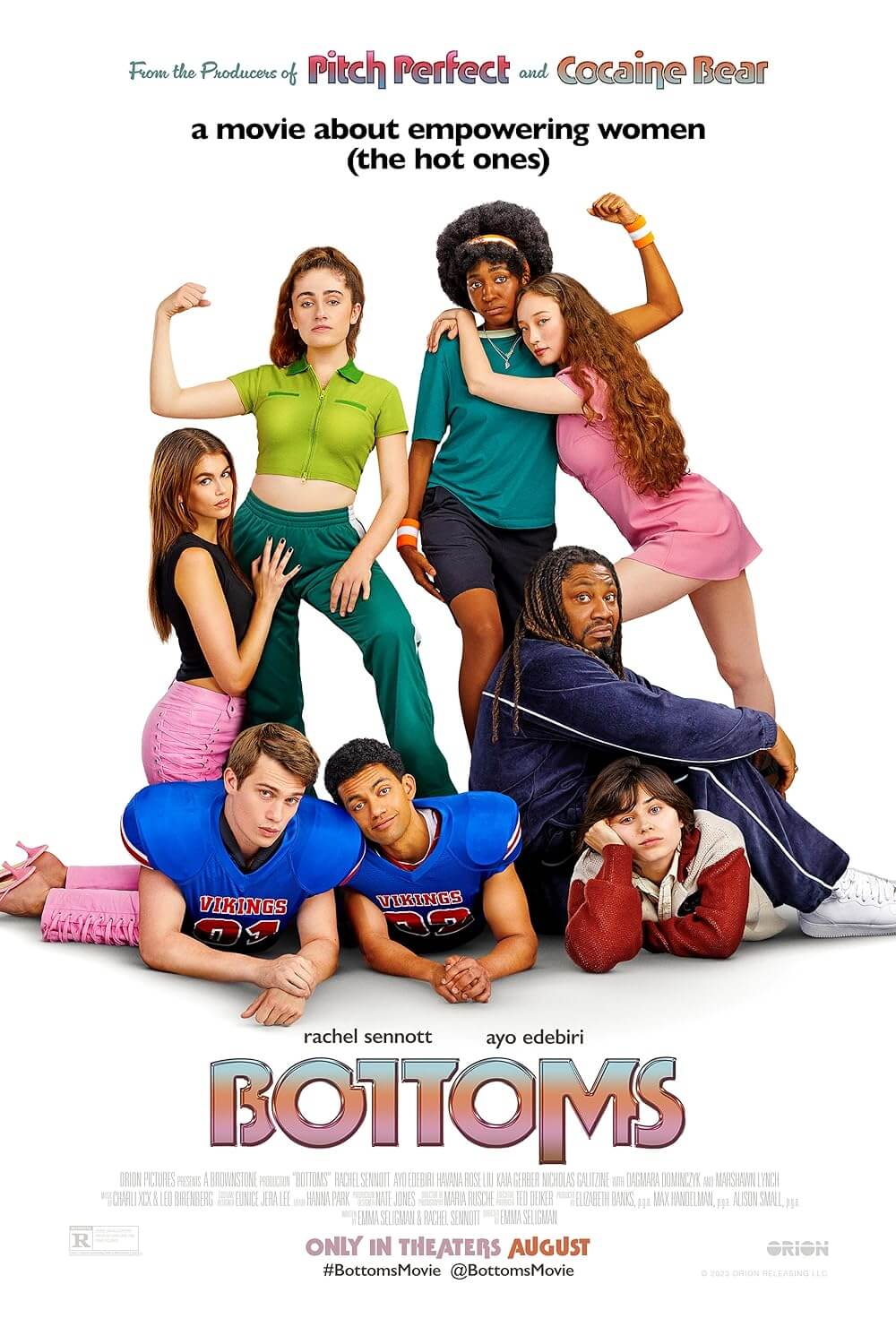
Thank You for Supporting Independent Film Criticism
If the work on DFR has added something meaningful to your love of movies, please consider supporting it.
Here are a few ways to show your support: make a one-time donation, join DFR’s Patreon for access to exclusive writing, or show your support in other ways.
Your contribution helps keep this site running independently. However you choose to support the site, please know that it’s appreciated.
Thank you for reading, and for making this work possible.
Brian Eggert | Critic, Founder
Deep Focus Review


